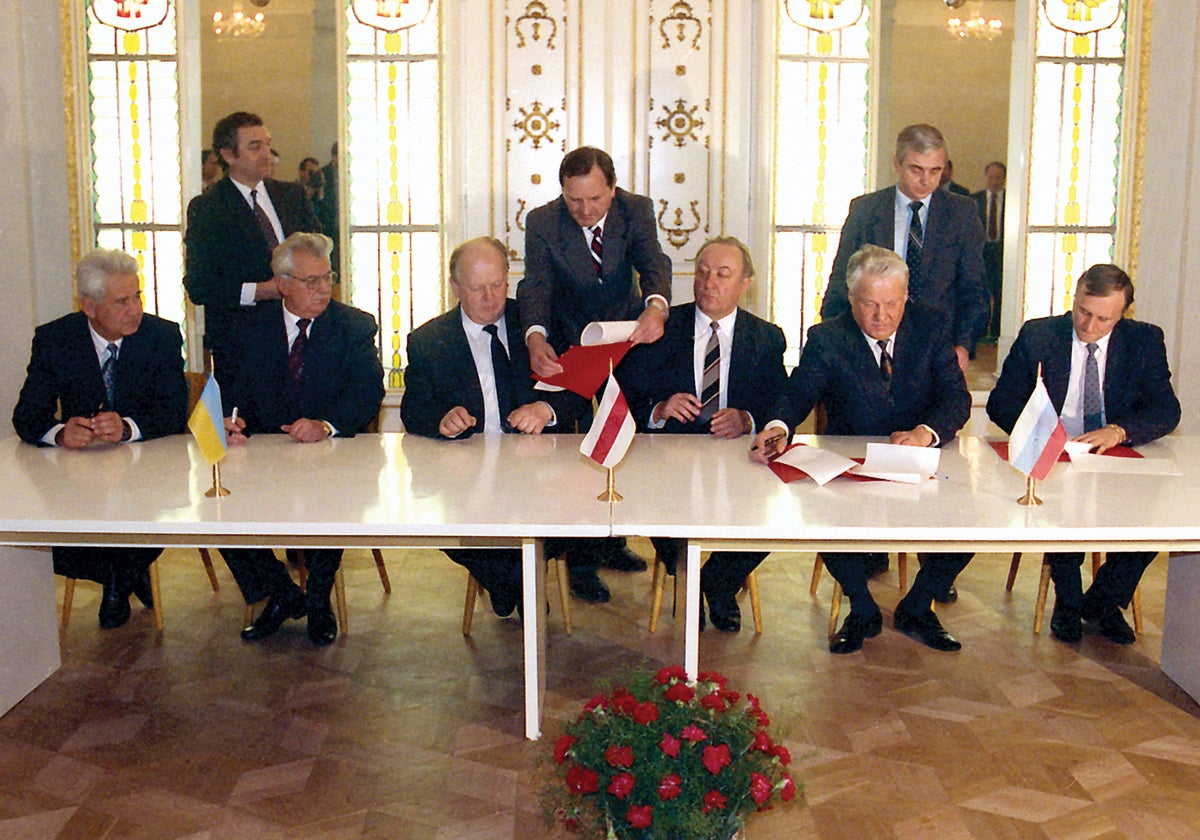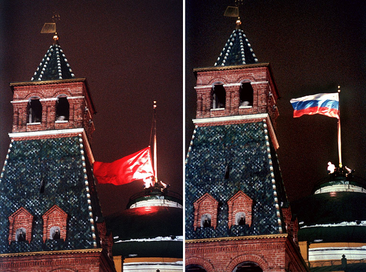Coup ended and Gorbachev returned. He though he will still be able to have a conciliatory prize in form of Presidency in USS. They indeed created the Presidential Counsil and held regular meetings to vote on this. Gorbachev also officially recognized independence of Estonia, Lativa and Lithuania, the most hell bent on independence trio, but he still hoped to persuade the rest to stay.
However, after the August coup, mood in the republics was very different from what it was before. Ukraine declared its independence on 24 of August, Moldova on 27, even Central Asian Kirghizstan did so on 31 of August and Uzbekistan on 1 of September.
That changed calculations even within Yeltsin team. They begin to think that without Ukraine, there is no point in keeping the union at all. Here Yeltsin could have declared independence of RSFSR but there were two reasons not to do it: first is concern that without Yeltsin presence in Presidential Council, Gorbachev would manage to persuade the rest to stay in the union, which would be a problem further down the line. Second is that Yeltsin would rather avoid dubious laurels of destroyer of the USSR. Both of these considerations made him prefer to wait until all other republics would simply declare their independence and then union would be dissolved by default.
While he was waiting, Yeltsin decided to dissolve CPSU: not so much to ban it, so much to liquidate and take possession of the party assets and finances. The party was a ginormous multimillion juggernaut of the organization with not only party owned offices but also residential real estate, vacation homes, resorts and what not. Yeltsin took possession of all party assets on the territory of RSFSR. Gorbachev then swiftly moved to dissolve party union wide and take possession of its assets in the rest of the union, to deny the slower republics all this lucrative property.
Also, among other things, different republics took time to rename themselves with less mouthful wordings. Some did if before august coup and others after. most would simply drop words 'Soviet' and 'Socialist' from their names. Some would drop republic as well, for example Ukraine. RSFSR too became Russian Federation or Russia.
Waiting game lasted until 27 October, when even backward Turkmenistan finally declared its independence. After that only Russia, Belarus and Kazakhstan were left in the union. That created a rather unexpected problem for Yeltsin plan: Kazakhstan's Nursultan Nazarbayev suddenly took Gorbachev's side on union issue. Together they pushed for continuation of what was left of the union.
To make matters worse, Gorbachev and Nazarbayev together has as many votes on Presidential Counsil as remaining pro-independence leaders, Yeltsin and Shushkevich. For a moment it could seem that Yeltsin plan had backfired on him, and the remainder of the USSR would continue to function, albeit with three republics only.
Suddenly it was Yeltsin who had to think of something to beat this sudden gridlock. However, by early December he found a solution.
Early December Ukraine held its independence referendum to confirm its independence with popular vote. Once results were out, they legally confirmed Ukraine's independence.
Yeltsin congratulated Ukraine's Kravchuk with this victory and invited him and Belarus's Shushkevich to Belavezha Forest to discuss the union question. This discussion produced the famous or infamous Belavezha Accords that ended USSR.
Yeltsin's aide Burbulis came up with this rather creative solution to Kazakhstan problem. Russia, Belarus, Ukraine and Transcaucasian Federation were founding states of the USSR, if the remaining three of these republics would denounce the treaty of creation of the USSR, then they could dissolve the union even against the wishes of Kazakhstan.
The Belavezha Accords itself avoided listing anything or anyone as initiator or dissolver of the USSR, as if it ceased to exist due to force majore. Gorbachev was among them, he refused to accept that union will be no more and wished to save it somehow.
While some legal experts question legality of the manner, in which Belavezha Accords dissolved the USSR, the three leaders present were satisfied with the document and signed. Belarus ratified it on 10 and Russia on 12.
That left only Kazakhstan, however Yeltsin offered to meet him in Almaty together with other leaders of former USSR but without Gorbachev. There on 16 of December they finally agree to Almaty protocol that confirmed Belavezha Accords and dissolved the USSR. Kazakhstan voted it in to put an end to the lengthy USSR saga.
Among other things it regulated various issues that would be result from dissolution of the USSR, such as Soviet property abroad, USSR foreign debt and legal continuity. Ukraine wanted property to be split, but the rest agree that Russia would take it all together with the Soviet debts.
Also, by 21 of December they agreed to create Commonwealth of Independent States, an international organization similar to Commonwealth of Nations, that would keep post-Soviet states culturally connected and smooth over the transition to independence. A number of other international organizations would be created between the post-soviet states.
Post-Soviet future finally took a concrete shape, in which USS or Gorbachev had no place.
On 23 December Soviet representative to the UN announced that he will be representing Russian Federation from now on as USSR cease to exist. The UN accepted that without any debate of objections. USSR lost even international recognition. The world accepted new reality.
Finally on 25 of December Gorbachev accepted it as well and resign. The following day what was left of USSR parliament also accepted it by voting in favour of motion on dissolution of the USSR.
The last soviet institution to accept new reality and Yeltsin's authority was Soviet Central Bank, who only did it in early 1992. Also, in 1992 some of the remaining MPs of the Soviet parliament wanted to open a new parliamentary session but were prevented from doing so by the police.
After 1992 a few individuals continue to insist that USSR still exists on various legal grounds.




No comments:
Post a Comment